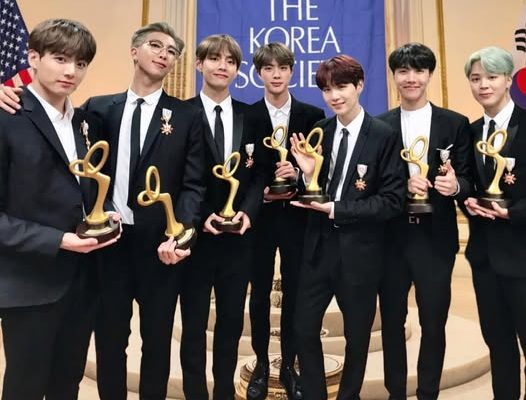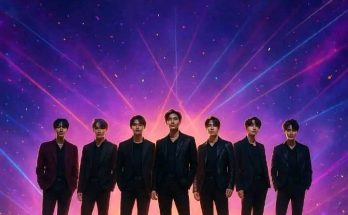BTS has been mentioned and nominated at the 2025 Van Fleet Annual Meeting – The Van Fleet Award recognizes contribution to promoting economic cooperation and friendship between Korea and the United States .
BTS has once again proven that their influence extends far beyond the borders of music. At the 2025 Van Fleet Annual Meeting, the globally renowned K-pop group was both mentioned and nominated for the prestigious Van Fleet Award — an honor that celebrates outstanding contributions to fostering economic cooperation and friendship between the Republic of Korea and the United States. This recognition stands as yet another powerful testament to the group’s impact not only as cultural icons but also as ambassadors of harmony, diplomacy, and unity through art.
The Van Fleet Award, established by The Korea Society in honor of General James A. Van Fleet, has historically been presented to individuals and organizations that have played a crucial role in strengthening U.S.-Korea relations. Past recipients have included world leaders, corporations, and cultural figures who have made meaningful efforts to bridge the two nations. In 2025, BTS joins the list of nominees, signifying the remarkable global influence the group has achieved since their debut, transcending entertainment and entering the realms of cultural diplomacy and international goodwill.
The recognition of BTS at such a diplomatic and economically significant platform is not surprising to those who have followed their career. Since their debut in 2013, the seven-member group—RM, Jin, Suga, J-Hope, Jimin, V, and Jungkook—has risen from modest beginnings to become one of the most powerful and unifying forces in global pop culture. Their artistry and authenticity have allowed them to connect deeply with millions worldwide, but it’s their role as cultural ambassadors that truly sets them apart. The group has consistently used their music and public platform to advocate for self-love, mental health awareness, and global unity, while simultaneously shining a light on Korean culture and values to audiences across the globe.
The Van Fleet Award nomination serves as formal recognition of how BTS has reshaped perceptions of Korea and its creative industries in the U.S. and beyond. Through their artistry, BTS has become one of South Korea’s greatest cultural exports, significantly contributing to the spread of Hallyu, or the Korean Wave, which encompasses music, film, cuisine, fashion, and language. This cultural phenomenon has not only enhanced Korea’s soft power but also generated measurable economic benefits for the nation. According to multiple reports over the years, BTS has contributed billions of dollars to the South Korean economy annually, influencing tourism, merchandise, and even stock markets. Their global concerts and collaborations have sparked economic and cultural exchanges that embody the essence of what the Van Fleet Award seeks to recognize.
The group’s connection to the United States is particularly profound. BTS first made their American television debut in 2017 at the American Music Awards, marking the beginning of a deepening relationship with U.S. audiences. Over the years, they have performed on major American stages—from the Grammy Awards to the United Nations headquarters—each time representing not only themselves but also their country. Their appearances and speeches have often emphasized mutual understanding, empathy, and cooperation, qualities that align perfectly with the spirit of the Van Fleet Award.
In particular, BTS’s 2021 speech at the White House stands out as a historic moment that symbolized the bridge between Korea and the United States. Invited by U.S. President Joe Biden, the group met with government officials to discuss anti-Asian hate crimes and the importance of inclusion and representation. Their presence at such a high-level political platform showcased how music and culture could foster dialogue and connection between nations. BTS’s leader, RM, eloquently expressed gratitude for the U.S.-Korea alliance and spoke about the shared values of diversity and respect. The meeting, broadcast worldwide, further cemented the group’s status as global ambassadors for positive change.
Beyond diplomacy, BTS has also had a direct hand in promoting economic cooperation between the two countries. Their collaborations with American artists such as Halsey, Nicki Minaj, Megan Thee Stallion, and Coldplay have not only created chart-topping hits but have also represented a fusion of cultural and economic interests. These collaborations have driven cross-border production, distribution, and marketing efforts, benefiting industries in both Korea and the U.S. In addition, BTS’s partnerships with global brands—including McDonald’s, Samsung, and Hyundai—have resulted in joint campaigns that appeal to international audiences, effectively intertwining the economic ecosystems of the two nations.
The group’s success has also played a critical role in paving the way for other Korean artists to enter the American market. Their achievements have opened doors for countless acts to perform, promote, and collaborate in the U.S., creating a dynamic two-way exchange of art and commerce. This wave of cultural influence continues to enhance the global perception of Korea as a hub of creativity and innovation. For The Korea Society, recognizing BTS at the Van Fleet Annual Meeting is not merely about acknowledging their fame but about honoring their tangible contributions to this evolving international partnership.
BTS’s leader, RM, has often spoken about the group’s sense of responsibility in representing their nation to the world. In speeches and interviews, he frequently mentions the importance of understanding one’s cultural roots while embracing global values. This dual identity—being proudly Korean yet universally relatable—has made BTS a symbol of modern diplomacy. Their use of language, for instance, reflects this balance: while most of their songs are primarily in Korean, they often incorporate English lyrics, allowing them to communicate across linguistic boundaries while maintaining their cultural authenticity.
The group’s messages of love, unity, and self-acceptance have resonated deeply in both Korean and American societies. Their fanbase, known as ARMY, represents a truly global community that transcends race, age, and nationality. This massive network of fans has become a movement in itself—engaging in charity work, disaster relief, and educational campaigns around the world. Many of these initiatives are inspired by BTS’s own philanthropic activities. Over the years, the band has donated millions of dollars to UNICEF, the Black Lives Matter movement, and various educational causes. Through these efforts, they have demonstrated how fame can be wielded for good, promoting values that align with global peace and cooperation.
At the 2025 Van Fleet Annual Meeting, the mention of BTS symbolized the recognition of how modern cultural figures can serve as vehicles for diplomacy. The meeting, attended by policymakers, diplomats, and business leaders from both nations, highlighted the evolving nature of international relations in the 21st century—where pop culture and creative industries play an increasingly central role. In an era where traditional diplomacy often struggles to bridge divides, artists like BTS succeed through authenticity and connection. Their ability to engage millions across continents is a reminder that shared culture can often achieve what politics alone cannot.
The Korea Society’s decision to nominate BTS also reflects the broader acknowledgment of soft power as a critical tool for fostering bilateral cooperation. South Korea has long invested in its cultural exports, and BTS represents the pinnacle of that strategy. Their influence in the United States has extended beyond music charts into education, fashion, and even technology. Korean language courses in U.S. universities have seen increased enrollment, often citing interest sparked by BTS and other K-pop artists. Korean brands have gained international recognition partly due to the group’s endorsements. These ripple effects underscore how art can shape economies and societies in ways that statistics can only partially capture.



